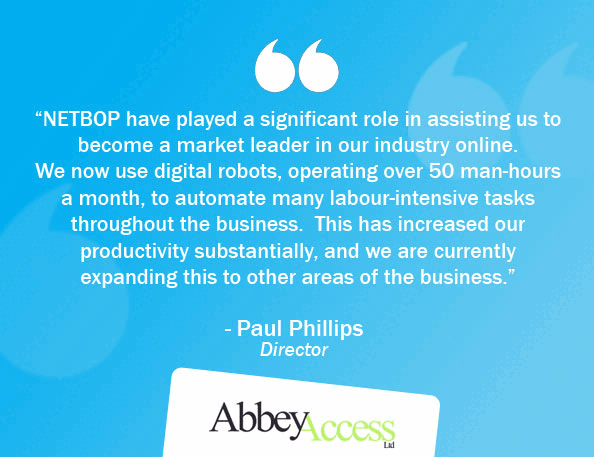We often get asked by our clients about the key differences between the different types of Automation, and what it actually is?
In most cases businesses will already be utilising some type of Automation in their daily routine, as many of the out-of-the box software provide some excellent features and many will configure those in-house (Example: Appointment reminders, Quote follow-ups, Invoice overdue notices etc.)
By adopting intelligent automation, organisations expect to achieve an average cost reduction of 31 per cent over the next three years, up from 24 per cent in 2020.SOURCE: Delloite Insights, Automation With Intelligence 2022
Pandemic or no pandemic, businesses are constantly looking at ways to be more efficient and gaining advantages over their competitors. It is now more important than ever to be set up and ready, not just for survival in difficult times, but to continue to succeed and subsequently thrive in a complex market.
At NETBOP we are delivering Automation specifically targeting areas where there are bottlenecks in business processes, which ultimately hold the business back from growth. In most cases this will be repetitive tasks which admin staff are carrying out (Example: Onboarding a new client and all its associated regulatory checks). More often than not we deliver Intelligent Automation where there is a high volume of data which needs time consuming analysis, validating against 3rd party data, local systems or against AI/Machine Learning before actioning with precision.
We offer the the following types of Automation:
- Intelligent Automation
- Digital Robots
- Digital Workers
- Attended Robots
- Unattended Robots
- Robotic Process Automation (RPA)
- Automation As-A-Service
- Cloud Automation
We deploy industry leading Enterprise software where the automation work can operate within your company infrastructure, interact with almost all software packages (online, offline and even when there is no API!) to carry out tasks securely with speed.
Where can Automation help?
Automation is suitable for tasks and processes that are:
- Repetitive and time-consuming: Automation can handle tasks in the background, allowing staff to concentrate on more productive areas of the business.
- Subject to human input errors: Even the most accurate and attention-detailed individual can have a typo that is easily missed. Automation can work with the data (e.g. an OCR that scans invoices) provided and will not misspell, mis-number or misrepresent the data.
- Rule-based: If you deal with a lot of spreadsheets, or operate an organisation that requires tasks to be generated/completed on fulfillment of certain criteria or events this process could be automated.

- Involve various amounts of digital data. Automation can work with your in-house software and integrate into your existing files and records to help simplify things like manual searches or record allocation. It can also aid with report generation, statistics or ensuring that details are sent to staff calendars.
- Have time critical deadlines. If your company or organisation needs to update or keep track of dates for customers to ensure accurate and timely action, then Automation can help you keep to those deadlines.
- Compiling details and information: If you need to perform a complex mail shot from existing customer data, or generate new leads from web searches, then the automation process can perform the time-consuming tasks that you need in quick time. From simply getting customer details from your existing database to getting the final prices from the FT Index every night, Automation can perform this task with ease.

How long does an Automation Project take?
Depending on the complexity of the task(s) you are looking to Automate, this ultimately will affect the length of time taken to design, develop, build, test and deliver a project. However, project deliveries are much faster than typically software development which can often take several months. In some cases we are able to deliver task automation within a few days, whereas other may take several weeks.
How much does it cost to Automate a process?
There is no one-size-fits-all answer to this question, as the cost of automating a process will vary depending several factors such as the specific process being automated, the scale of the automation project, and the specific tools and technologies used.
However, as a general rule of thumb, projects we deliver could expect to invest anywhere from a few thousand pounds and upwards in order to automate a process.
Do I need to change my Software/CRM Systems?
There is no requirement to change you current systems. We have several types of different automation technologies available and most will allow interaction directly within your existing systems and products just as if a person/staff member was accessing it on their computer. This allows us to create an automated workflow stitched around your existing systems. In most cases there would be several systems which may be a combination of on-premise software and Cloud Based software.
In rare instances we may need you to change a document template but in 99.99% of cases we integrate with no issue.
What happens if I my process changes?
When a project is discussed we can work with you to understand how best you would like the system to be both maintained or changes carried out in the future. We can either offer an adhoc support to carry out changes or in most cases will discuss an ongoing maintenance/development retainer.
